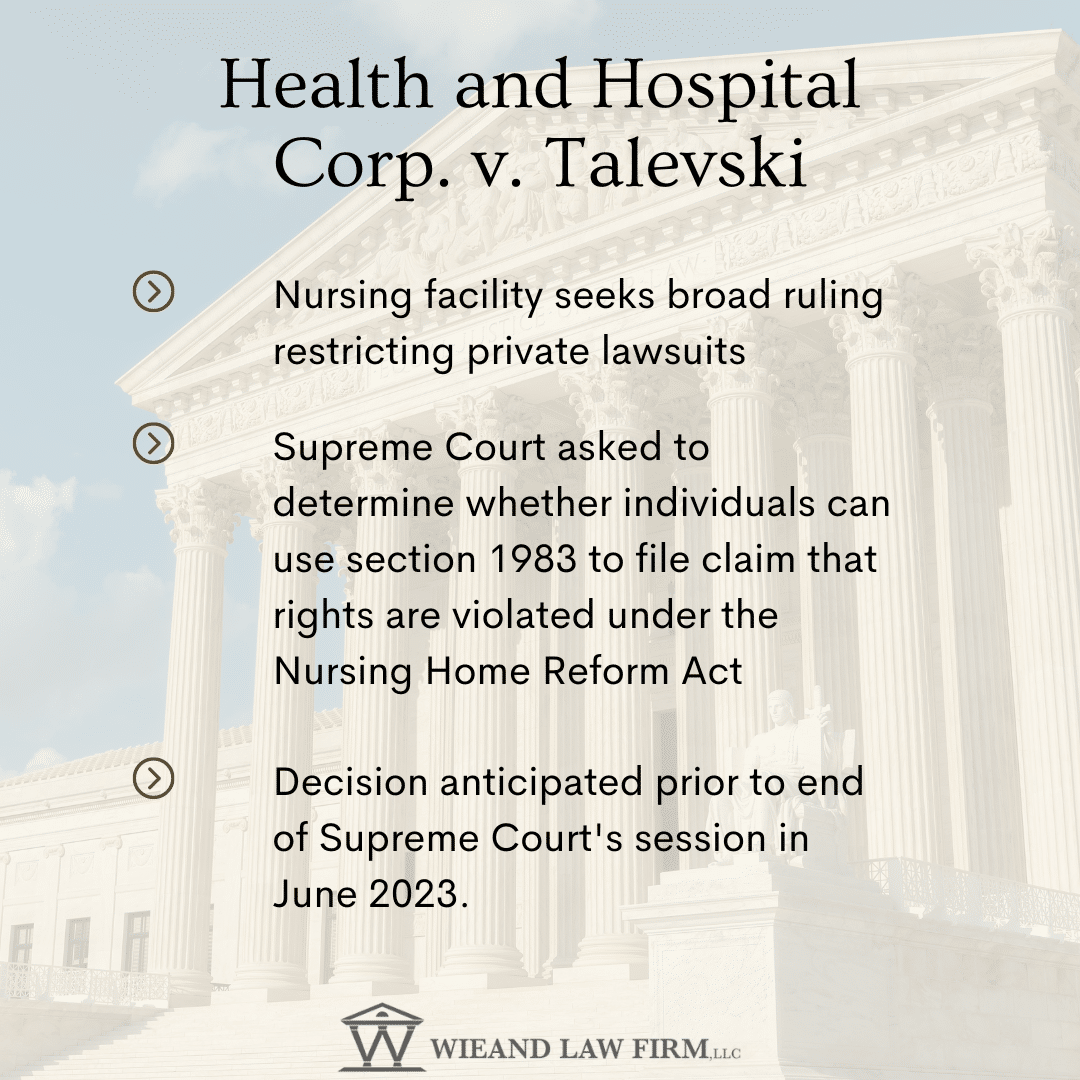 Oral arguments before the Supreme Court began on Tuesday in Health and Hospital Corp. v Talevski. According to PA nursing home lawyers, this case seeks to determine whether there is a private right of action for individuals to sue county and state entities that deliver federally funded benefits. Additionally, the case seeks to determine whether there is a private right of action to sue county and state entities under the Nursing Home Reform Act of 1987. PA nursing home lawyers are watching this case, which will determine if Talevski has a private right to sue.
Oral arguments before the Supreme Court began on Tuesday in Health and Hospital Corp. v Talevski. According to PA nursing home lawyers, this case seeks to determine whether there is a private right of action for individuals to sue county and state entities that deliver federally funded benefits. Additionally, the case seeks to determine whether there is a private right of action to sue county and state entities under the Nursing Home Reform Act of 1987. PA nursing home lawyers are watching this case, which will determine if Talevski has a private right to sue.
Case Background
The Talevski family sued Health and Hospital Corporation for alleged mistreatment of resident George Talevski while he was a resident at the Valparaiso Care and Rehabilitation Center, a government nursing facility in Indiana. Valparaiso Care and Rehabilitation Center is owned by Health and Hospital Corp, a municipal entity. The alleged mistreatment involved improper use of psychotropic medications and multiple transfers to other facilities.
Mr. Talevski’s family disagreed with his plan of care and transfers. The facility claimed that Mr. Talevski’s violent and aggressive behavior necessitated the psychotropic medications and transfers, while the family claimed that the facility abused him.
Talevski’s wife, who was also his legal guardian, filed a Section 1983 action on his behalf alleging violations of his rights under the Federal Nursing Home Reform Act. While the district court dismissed the action, the U.S. Court of Appeals for the 7th Circuit reversed this decision. The case was accepted and is now being heard by the U.S. Supreme Court. PA nursing home lawyers understand that this case will have far-reaching impacts for residents throughout the United States who reside in government-owned nursing facilities.
Private Right To Sue?
Federal Statue Section 1983 allows individuals to sue certain government entities and employees for violations of their civil rights. However, this case questions whether this statue applies to government entities that already have governmental oversight and other remedies to address violations.
Had Mr. Taleski resided in a privately owned nursing home, the Talevskis would have been able to file a civil lawsuit against the company to address their grievances. Privately run nursing homes may accept federal reimbursement through Medicare, but they aren’t operated by a government entity and therefore are not covered by Section 1983.
Health and Hospital Corporation Arguments
Health and Hospital Corporation entreat the court to overrule established precedent and decide that spending clause enactments are not enforceable through Section 1983, arguing that the background of 1971 common law did not allow third-party beneficiaries to endorse government contracts. Therefore, a resident of a nursing facility receiving federal funds is a third-party beneficiary that cannot enforce that contract. Health and Hospital Corporation promotes that stare decisis should not apply to Section 1983, a “common law statue”, they advocate is subject to greater judicial control and less legislative control. A broad ruling in favor of the Health and Hospital Corporation may mean that millions of Americans who use federal assistance programs would lose their right to sue over rights violations.
Talevski Arguments
Talevski argues that the spending clause legislation should be treated no differently than legislation enacted under another power. They forward the belief that Section 1983 is an existing, congressionally created cause of action for enforcement of other federal laws, and that this has been the court’s consistent interpretation for over 50 years.
Talevski offers arguments for the court to support stare decisis in this case. Talveski argues that HHC challenges not just a singular case, but a “long line of precedents” reaffirming one another including numerous lower court decisions and involving multiple statues. Talevski states that overruling precedent would result in instability because Section 1983 is woven into the enforcement of practically every federal program. The existing framework permits enforcement of the Federal Nursing Home Reform Act under Section 1983 as the law creates enforceable rights. These rights describe a resident’s entitlements that the nursing home is required to protect, and the Federal Nursing Home Reform Act made these rights a condition of participation in the Medicaid program.
Talevski argues that state and federal enforcement of the Federal Nursing Home Reform Act through penalties and other administrative remedies have not been considered adequate to correct wrongdoings through monetary damages or prevent future misconduct. PA nursing home lawyers who fight on the behalf of injured residents support Talevski in this case, saying that federal oversight is insufficient and that civil rights lawsuits are a critical enforcement mechanism.
Since the Supreme Court agreed to hear the case, over 25 entities have filed amicus briefs, with the majority – such as AARP, the American Health Association, and House Speaker Nancy Pelosi – siding with Talevski.
United States Amicus Curae Arguments
The United States appears as amicus curae, with argument time. While not supporting any party, they agreed with Talevski that the court should not overrule precedent allowing Section 1932 enforcement of spending clause enactments. The United States also agreed that the Federal Nursing Home Reform Act created enforceable individual rights. However, they argue that the administrative remedies available in this case spell out specific enforcement mechanisms. The Supreme Court will need to determine if the administrative and oversight remedies that are enough to protect the great majority of right holders under FNHRA who cannot be sued under Section 1983, are enough to protect all FNHRA rights holders.
Future Ruling “Up In The Air”
A ruling is anticipated prior to the end of the court’s session in June. The final answer may be aligned on the conservative-liberal division of the justices. Tension is predicted as the justices try to determine if the decision should be based on existing case law or based on a new standard. The justices will need to consider whether the Nursing Home Reform Act was sufficient to regulate both private and public entities.
Contact the Wieand Law Firm Today
Understanding your right to sue for nursing home negligence is an important first step to fight back against nursing home negligence. The PA nursing home lawyers at the Wieand Law Firm offer a free case review and consultation to help you understand your legal options. Call 215-666-7777 or send us a message via the online form on our website to speak directly with an attorney.
